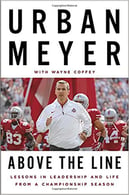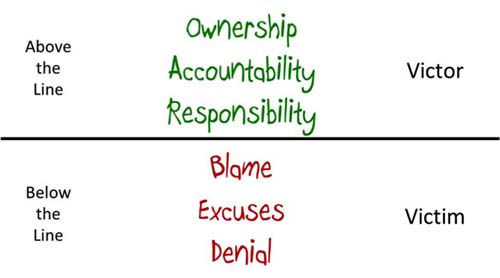 Driven leaders too frequently downplay the importance of Culture and the soft issues around People, that include Strategy elements like Core Values and Core Purpose.
Driven leaders too frequently downplay the importance of Culture and the soft issues around People, that include Strategy elements like Core Values and Core Purpose.
In Urban Meyers book Above the Line, Meyer dedicates a chapter to Creating a Culture. The subtitle is Leaders Create Culture. Culture Drives Behavior, Behavior Produces Results.
The subtitle alone might surprise many A-type personalities who are all about performance, who seldom recognize the value culture has on influencing a business’s performance.
 One of the more striking examples of Meyer’s belief system on culture is this quote from the book, “Talent, schemes, tactics, and plans cannot replace a strong culture. A great culture can make even a mediocre strategy successful, but a weak culture will undermine even the best strategy.”
One of the more striking examples of Meyer’s belief system on culture is this quote from the book, “Talent, schemes, tactics, and plans cannot replace a strong culture. A great culture can make even a mediocre strategy successful, but a weak culture will undermine even the best strategy.”
Meyer defines culture as, “Culture is what we believe, how we behave, and the experience that our behavior produces for each other. That last point is critical. People experience culture through behavior. Strategy determines scheme and technique. Culture determines attitude and effort. Once strategy has been developed, success becomes a matter of attitude and effort. And that’s where culture comes in.”
Based on this definition, how would your grade your business culture? If culture determines attitude and effort, what is the attitude and effort of your team telling you?
Meyer provides what I consider a formal accusation of your business if it’s not performing to the expectations you expect, “Your team, business, or organization will perform to the level of leadership you provide. It is no secret that the critical factor in the success of a business is the quality of its leaders. Remember, leadership isn’t a difference maker, it is the difference maker. Often what differentiates a great business from an average business is the effectiveness of its leaders.”
Culture is not just the leader at the head of the business, it’s apportioned to the leadership team as well, “…the performance of the players in your unit is a reflection of the culture you create.”
Meyer’s culture includes something he calls BCD – Blame, Complain, Deny. Responsibility starts and ends with the leader, yet extends to each individual, “As a leader, you are responsible for creating a winning culture that drives behavior and produces winning results. It’s not someone else’s job. It’s your job!”
 ABOVE THE LINE / BELOW THE LINE
ABOVE THE LINE / BELOW THE LINE
Meyer’s definition of Above the Line behavior could easily be an annual theme or a purpose for any business.
The performance of a team rises or falls on behavior. Winning behavior is intentional, on purpose and skillful. It is Above the Line. But it’s easier to be impulsive, on autopilot and resistant. This is Below the Line. Below the Line is dangerous, because it is comfortable and convenient. It is the path of least resistance.
 Above the Line behavior is conscious and thoughtful – a choice made in alignment with your larger vision or where you want to go. Below the Line behavior is directed by impulse or the gravitational pull of old habits; you just react without thinking. Below the Line is your default response.
Above the Line behavior is conscious and thoughtful – a choice made in alignment with your larger vision or where you want to go. Below the Line behavior is directed by impulse or the gravitational pull of old habits; you just react without thinking. Below the Line is your default response.
It isn’t hard to find people who are caught up in Below the Line behavior. All you need to do is look for those whose first reaction is to blame (others), complain (about circumstances), and defend (yourself) or BCD.
Ask yourself this question: Is your team quick to blame, complain or defend themselves? If they are, then certainly they are acting irresponsibly, and by Meyer’s definition, Below the Line. A quick guess. If your team is in BCD mode, your culture is not driving winning results. You need to change. You need to adopt an Above the Line culture and weed out the members unwilling to believe, behave, and experience the culture you’re coaching.
.jpg?width=307&name=E%20+%20R%20=%20O%20(Event%20+%20Response%20=%20Outcome).jpg) E + R = O (Event + Response = Outcome)
E + R = O (Event + Response = Outcome)
Meyer believes we don’t control the events in life and we don’t directly control the outcomes. But we always have control over how we choose to respond.
Big Es and Big Os require Big Rs.
How you respond: Meyer calls it the “R Factor.”
Six R Factor Disciplines Meyer’s teach to players:
- Press Pause – gives you time to think, gets you off autopilot, avoid doing something foolish or harmful, focus on acting with purpose
- Get Your Mind Right – What you focus on, how you talk to yourself, productive vs negative mindset, Irritated Mindset or Survival Mindset (both below the line) vs. Purpose mindset (above the line)
- Step Up – Understand the situation, understand what is required of you and respond above the line
- Adjust & Adapt – Consider current path of your R Factor habits. Where are they taking you? Where do you want to go? Adjust.
- Make a Difference – take complete ownership of the experience you give others and your contribution to the team’s culture
- Build Skill – Elite performers build skill above their talents. Talent is a gift, greatness is a choice.
Under pressure, we do not rise to the occasion. We rise or fall to the level of our training.
In football, when contact is made, it is too late to train and build skill. We must prepare and develop our R Factor capacity before we experience challenging situations. Under pressure, the R Factor habits that will be available to you are the ones you have purposefully built into your life.
A rapidly changing world deals ruthlessly with people who fail to adapt. If you don’t like change, you are going to like irrelevance even less. (Read Out Think the Competition)
Exceptional performance is the result of an uncommon level of focus and discipline in the pursuit of greatness.
Meyer isn’t the first to say, “Culture Eats Strategy for Lunch.” Management guru, Peter Drucker said, "Culture Eats Strategy for Breakfast." Curt Coffman and Kathie Sorensen wrote a book by this title, Culture Eats Strategy for Lunch: The Secret of Extraordinary Results, Igniting the Passion Within.
Looking for help building a dynamic and performance oriented culture in your business? We have the tools and resources to, “make it so!” Contact dwick@positioningsystems.com for help.
NEXT BLOG – BRAND ADVOCATES
One of my favorite sources for customer service, is John Dijulius. We consistently reinforce the significance of customer and employee feedback, recommending tools like Net Promoter Score (NPS), and employee engagement Q12, and most recently the employee Net Promoter Score (eNPS). Your most highly satisfied customers share positive information about your product and services, without being asked or paid to do so. These Brand Advocates influence 20-50% of all purchases. Who are they and how you can leverage these advocates of your business is our next blog.






.jpeg?width=150&height=135&name=Hand%20with%20marker%20writing%20the%20question%20Whats%20Next_%20(1).jpeg)

